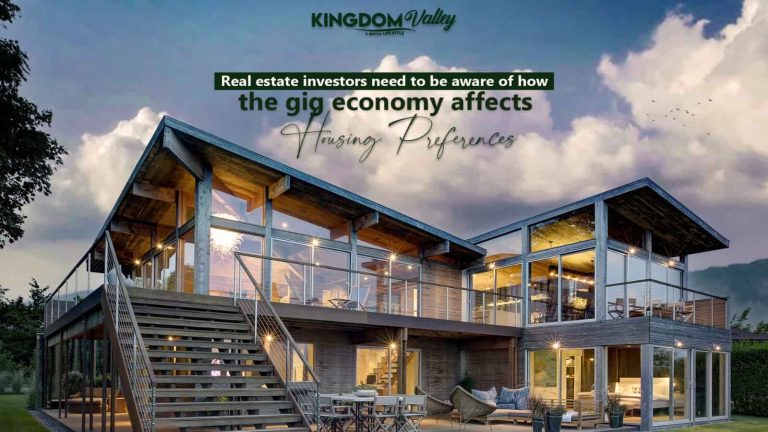Real estate investors need to be aware of how the gig economy affects housing preferences

The gig economy has become a significant and powerful economic force in recent years. This modern way of working, which often involves freelancing, short-term contracts, and on-demand tasks. It has not only transformed how people earn a living but also how they choose to live like Real estate investor. One interesting case study in this regard is the Kingdom Valley projects in Islamabad and Lahore. Which highlight the impact of the gig economy on housing preferences.
The Gig Economy: What Is It?
The freelance or on-demand economy, sometimes referred to as the gig economy. Is a labor market where freelancing or short-term contracts are common. In the gig economy, people frequently work independently. On a variety of projects or tasks in place of typical 9 to 5 occupations. This shift in employment patterns has led to significant changes in lifestyle choices, including housing preferences.
Flexible Housing Options
One of the most noticeable effects of the gig economy on housing. Is the demand for flexible and adaptable housing options. Kingdom Valley projects in Islamabad and Lahore have responded to this need by offering a variety of housing types, including apartments, townhouses, and standalone homes. These options allow residents to choose a space that suits their ever-changing work schedules and income levels.
Remote Work Considerations
The rise of remote work, which is closely associated with the gig economy. Has allowed people to work from anywhere with an internet connection. This newfound flexibility has led to a migration of professionals. From crowded urban centers to more affordable and serene locations like Kingdom Valley Islamabad and Kingdom Valley Lahore. The allure of these projects lies in their peaceful surroundings and modern amenities. Making them attractive options for remote workers.
Community Spaces and Networking
Real estate investors should take note of the gig economy’s impact on housing preferences. As it has also influenced the desire for communal living and networking opportunities. Kingdom Valley projects offer residents shared spaces, such as co-working areas, fitness centers, and community gardens. These facilities serve the requirements of independent contractors. Who value the opportunity to network with like-minded people and work together on projects.
Income Volatility
One challenge faced by gig workers is income volatility. While these workers often enjoy the freedom and flexibility of their jobs, they may also encounter fluctuations in their earnings. This financial uncertainty has led many gig economy professionals to prioritize affordability when it comes to housing. The Kingdom Valley projects are designed with a range of housing options. Ensuring that there are choices to fit different budgets, making them a suitable match for those with variable income streams.
Accessibility to Urban Hubs
Another consideration for real estate investors is the accessibility of housing projects to urban hubs. While many gig economy professionals prefer to live in serene environments, they also need easy access to the heart of the city. Kingdom Valley Islamabad and Kingdom Valley Lahore offer residents the best of both worlds. These projects are ideally situated to offer gig workers a tranquil haven close to the metropolitan conveniences and employment possibilities they need.
Conclusion
The gig economy has significantly influenced housing preferences, and real estate investors should pay attention to these trends. Kingdom Valley projects in Islamabad and Lahore are prime examples of how the gig economy has shaped the real estate market. By providing flexible housing options, catering to remote work needs, fostering a sense of community, and offering a range of affordable choices, these projects have adapted to the evolving preferences of gig workers. As the gig economy continues to grow, real estate investors who understand and respond to these changes will find opportunities to thrive in the ever-changing landscape of housing.
